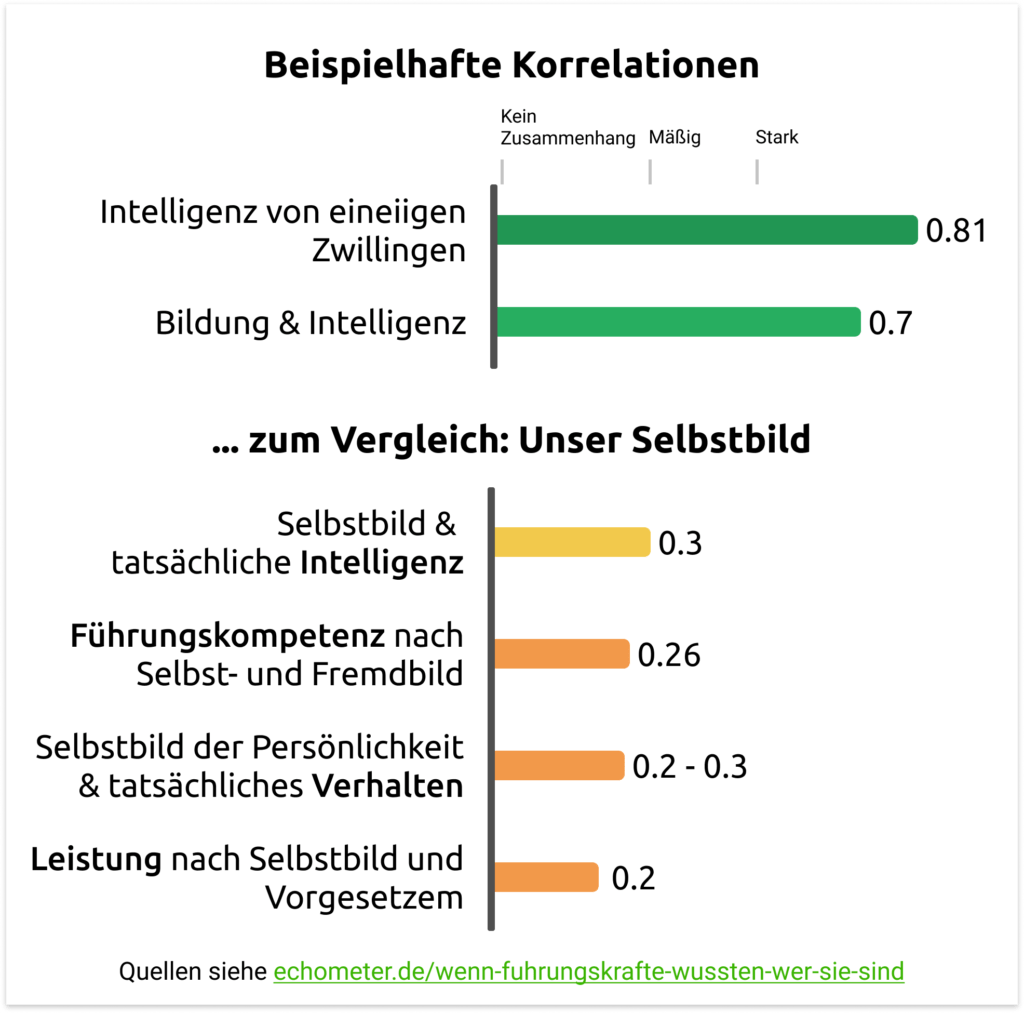Probably everyone claims to have the ability to self-reflect. A personal example shows that this is not necessarily the case: Last Thursday, after five years, I happened to meet a schoolmate, Johannes, when we were traveling to a career fair with Echometer (see our Linked-In Post). After a short conversation it came out of him:
“Last week I talked to Lukas about you. I made fun of your speaking style. You used to talk so choppy at school ... like staccato. ”Thank you, Johannes. Good to see you. I found it funny. And he also immediately forwarded: "Now you don't talk like that anymore."
The interesting thing about the whole thing: I was not aware at school that I was perceived in this way, nor did I notice any change over the years. And there we are in the middle of the topic.
How well can I actually assess myself in terms of things like personality, performance and intelligence? This question is very relevant in the work context - and certainly a particularly important requirement for managers. Studies show:
The better a manager can assess himself, the better the performance, social behavior and loyalty of an employee.
Whittington, Coker, Goodwin, Ickes, & Murray, 2009; Fleenor, Smither, Atwater, Braddy & Sturm, 2010
One thing in advance: what are correlations?
In order to answer the question of the accuracy of self-assessment, for example on personality - and thus the question of the most important requirement for managers - it helps to understand what correlations are. A correlation is a statistical measure of how closely two variables are related. It can range from -1 to 1, with a negative number implying a negative relationship. The closer the correlation is to 0, the less the relationship.
These examples should make it clearer: Identical twins have the same genetic requirements. So if one of the twins is very intelligent, the other is probably also (correlation: 0.81; Loehlin, 1992).
Another example: Those who are intelligent are also more educated (correlation: 0.70). Or: The poorer someone is, the more likely he or she is to commit criminal offenses (correlation: 0.25; Hsieh & Pugh, 1993). In the latter example, the relationship is already significantly lower. Related to this: The examples show that a correlation is not always synonymous with a causal relationship (!) best agile metric in this.
But how high is the connection between mine assessment my personality and mine actual Personality?
Requirements for managers: connection between self-perception and external perception
Quite little. The following graphic shows the relationships.

What does that tell us? That our self-assessment & #8211; our self image & #8211; is relatively inaccurate. Not only good managers, but also scrum masters or coaches should be aware of this phenomenon and always practice self-reflection. But not only the & #8211; It is also helpful to get regular feedback. What can help here and why we can assess ourselves so badly at all is dealt with by Jean in this blog post.
If you want to speed up the reflection process and thus a very important requirement for managers, it is worth taking a look at our 360º feedback tool, 360-degree feedback can be observed if some central rules are observed (see also another blog article by me) & #8211; well suited to stimulate our self-perception through reflection. And eventually even provoke behavioral changes in individuals.
Management Requirements - Sources
Atwater, L., Waldman, D., Ostroff, C., Robie, C., & Johnson, KM (2005). Self – other agreement: Comparing its relationship with performance in the US and Europe. International Journal of Selection and Assessment, 13 (1), 25-40.
Asendorpf, JB (2015). Person-centered approaches to personality.
Fleenor, JW, Smither, JW, Atwater, LE, Braddy, PW, & Sturm, RE (2010). Self – other rating agreement in leadership: A review. The Leadership Quarterly, 21 (6), 1005-1034.
Harris, MM, & Schaubroeck, J. (1988). A meta-analysis of self-supervisor, self-peer, and peer-supervisor ratings. personnel psychology, 41 (1), 43-62.
Hsieh, CC, & Pugh, MD (1993). Poverty, income inequality, and violent crime: a meta-analysis of recent aggregate data studies. Criminal justice review, 18 (2), 182-202.
Loehlin, JC (1992). Genes and environment in personality development. Newbury Park, CA: Sage
Whittington, JL, Coker, RH, Goodwin, VL, Ickes, W., & Murray, B. (2009). Transactional leadership revisited: self – other agreement and its consequences. Journal of Applied Social Psychology, 39 (8), 1860-1886.
Title picture designed yanalya / Freepik.







